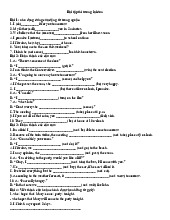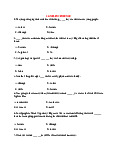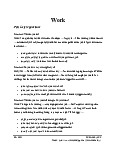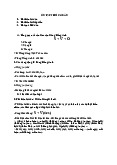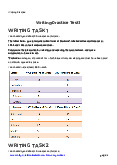





Preview text:
PRACTICE TEST
I. Choose the best answer (A, B, C or D) to complete each of the sentences.(10 pts)
1. She saw ________ the deception immediately. A. round B. past C. into D. through
2. Lack of sleep over the last few months is finally ________ Jane. A. catching up with B. getting on with C. coming over D. putting on
3. Please don’t ________ it amiss if I make a few suggestions for improvement. A. think B. assume C. take D. judge
4. - "Would you like to join our volunteer group this summer?" - "______"
A. Do you think I would? B. I wouldn't. Thank you.
C. Yes, you're a good friend. D. Yes, I'd love to. Thanks.
5. If I make a fool of myself in front of my friends, I’ll never ________ it down. A. let B. give C. settle D. live
6. Because of his poor health, it took him along time to ________ his bad cold. A. throw off B. throw away C. throw down D. throw over
7. He is late for every conference without ________. A. suspicion B. fail C. doubt D. delay
8. The woman’s clothes gave no ________to her origin. A. sign B. signal C. clue D. hint
9. In spite of his poor education, he was the most ________ speaker. A. articulate B. ambiguous C. attentive D. authoritarian
10. Sheila couldn’t attend the meeting as the date ________ with her holidays. A. clashed B. struck C. opposed D. occurred
11. Her refusal to join us is nothing ________ of ridiculous. A. less B. more C. short D. far
12. I don’t want lots of excuses, I just want to hear the ________ truth. A. clear B. pure C. right D. plain
13. It was with a ________ heart that she said goodbye to all her colleagues. A. solemn B. heavy C. dismal D. grim
14. When facing problems, it is important to keep a sense of ________ . A. proportion B. introspection C. relativity D. comparison
15. “But son,” I told him , “you ’re my own_______. A. heart to heart B. body and soul C. flesh and blood D. skin and bone
16. Seeing her mother shot by a terrorist left an _______impression on the young child’s mind. A. instant B. indelible C. indefinite D. infinite
17. Children can be difficult to teach because of their short attention __________ . A. limit B. duration C. span D. time
18. “Another cup of coffee?” — “No, but thanks __________. A. not at all B. for all C. all the same D. you for all
19. _______ are a form of carbon has been known since the late eighteenth century. A. Diamonds B. Because diamonds C. That diamonds D. Diamonds, which
20. One of the tenets of New Criticism is that a critic need not tell readers _____ about a story. A. which thinking B. what to think C. that thinking D. to think what
II. The passage below contains 10 mistakes. Underline the mistakes and correct them. (10 pts)
Oxford is a city with such a mind-blowing reputation that many who come here find them
intimidated by the place and can’t wait to leave, while others, taking with it like a duck to water, find
themselves returning again and again. The college lawns provide a gorgeous backdrop to seriously
study, and in the right light, on a sunny winter’s morning saying, one feels as if one is floated on air,
such is the sense of unreality. Oxford may like to pretend that it is at the intellectual hub of things,
but in many ways it is no less than a sleepy backwater where, to mix metaphors, transitory
students, the cream of their generation, wait for the wings, allowing their talents to flourish before
moving off into the industrial or political fast-lane. Much of this is the myth, of course. Hardship and
hard work are very much part and parcel of student life. The level-headed get through the three
years’ hard grind by simple putting their shoulders to the wheel before going on to fairly average
jobs. Only for the tiny minor is Oxford the first step on the ladder to fame and fortune.
III. Fill in each of the blanks a suitable preposition (10 pts)
1. The doctor is busy right now, but she could probably fit you ______ later.
2. It was a good idea, but I am afraid it didn’t quite come______
3. I couldn’t pin Ann ______ to a definite answer.
4. His heart attack was brought ______by too much stress at work.
5. The victims of the industrial accident should, ______ rights, be compensated by the factory owners.
6. As nobody seems to know what to do next, may I put ______ a proposal?
7. I’m sorry to hear that Dick and Peter have fallen ______.They were such good friends.
8. He was taken ______by her aggressive attitude.
9. His business has gone ______, and he has lost everything.
10.My husband brought me some flowers today. He must be ______ something!
IV. Write the correct form of the word given in brackets. (15 pts)
1. The government’s policy on arms is shocking. It is quite _____ (defend)
2. Despite going to German classes twice a week, I don’t feel I’m making much _____ with the language. (head)
3. John always knows how to _______the party with his jokes. (lively)
4. The fire-prevention system is _____ by any small increase in temperature. (active)
5. The government’s ______ approach has brought criticism. (compromise)
6. Your presence has enriched our lives________(measure).
7. She won the first prize in the contest due to her________(persuade)
8. All________ must be received before July 20th 2007. (apply)
9. The women employed in the mines were ______ young and married. (dominance)
10. The outcome of the election is a ______ conclusion. (go)
V. Write the correct form of the word given in brackets. (15 pts) The Meaning of Dreams
Until the twentieth century most scientists argued that dream were nothing but a random jumble of
completely (1) COMPREHEND ……. images remaining from the sensory accumulation of our daily
lives. Since the idea that dreams have meaning in their own way became popular, (2)
PSYCHOLOGY………. have proposed (3) COUNT ……. theories to explain the logic of dreams.
The bewildering nature of this logic reflects the primary source of the dreams outside the tidy
confines of the conscious mind. A dream can be a response to events in the outside world, or it can
(4) ORIGIN …… within, expressing aspects of the dreamer’s deep-seated feelings; it can fulfil
desires or highlight unresolved emotions in the dreamer’s life. Not (5) EXPECT……, the
contradictions implicit in these complex processes are reflected in the syntax of dreams. Often (6)
ENIGMA……., halting and fragmentary, the language of dreams can warp time, bringing together
historical and contemporary figures. It can mix the familiar with the (7) KNOW……., and work
fantastic transformations by its own band of magic. Scenes in dreams merge (8) MYSTERY…….
into one another, as in certain movies. People or animals may fly or inanimate things may move (9)
DEPEND…… and talk. It is out of such complex and contrary (10) HAPPEN…… that the meanings of dreams have to be teased.
VI. Read the text below and decide which answer (A, B, C or D) best fits each space. (15 pts) A Powerful Influence
There can be no (1)…..at all that the internet has made a huge difference to our lives. Parents are
worried that children spend too much time playing on the internet, hardly (2)….. doing anything
else in their spare time. Naturally, parents are (3)…..to find out why the internet is so attractive, and
they want to know if it can be (4)…..for their children. Should parents worry if their children are
spending that much time (5)…..their computer?
Obviously, if children are bent over their computers for hours,(6)…..in some game, instead of doing
their homework, then something is wrong. Parents and children could decide how much use the
child should (7)…..of the internet, and the child should give his or her (8)…..that it won’t interfere
with homework. If the child is not holding to this arrangement, the parent can take more drastic (9)
…… Dealing with a child’s use of the Internet is not much different from (10)…..any other sort of bargain about behaviour.
Any parent who is (11)…..alarmed about a child’s behavior should make an appointment to (12)
…..the matter with a teacher. Spending time in front of the screen does not (13)…..affect a child’s
performance at school. Even if a child is (14)…..crazy about using the internet, he or she is
probably just (15)…..through a phase, and in a few months there will be something else to worry about! 1 A doubt B reason C purpose D motive 2 A always B rarely C never D ever 3 A worried B concerned C curious D hopeful 4 A harming B harmful C hurting D hurtful 5 A staring at B glancing at C looking D watching 6 A supposed B occupied C interested D absorbed 7 A do B have C make D create 8 A word B promise C vow D claim 9 A rules B procedures C regulations D steps 10 A dealing B negotiating C having D arranging 11 A widely B heavily C seriously D broadly 12 A speak B discuss C talk D debate 13 A possibly B necessarily C probably D consequently 14 A absolutely B more C quite D a lot 15 A going B passing C travelling D walking
VII. Fill each of the numbered blanks in the passage with one suitable word. (15 pts) Endangered species
The future of African elephant depends on man. No (1)______ can human beings and wild animals
live in (2)______throughout vast areas of the continent as was possible in days gone by, for man’s
needs have increased as well as his numbers. There are regions, such as the Congo forests and
the equatorial Sudan, (3)______ the old relationship may remain for a few more years or even
generations, but in general it has gone. Conservation, (4)______it is to be effective, must be a
positive, constructive policy, and it is (5)______ thinking to imagine otherwise, particularly in the
case of the elephant. And if this is not yet true of the whole of Africa, it soon will be, for the increase
in the human population is almost universal. Where human beings and wild animals find (6)
______ in competition with each other, the animals will lose. Even if (7)______ appears to be
enough room for both, man will not tolerate (8)______ long a situation in which elephants and other
creatures make even occasional raids on his fields of food or economic crops. For many years
(9)______ has been a major cause of conflicting interests and (10)______ of the reasons why so
many elephants have been shot to control their numbers.
VIII. Read the following passage and choose the best answer (A, B, C or D) to each question. (15pts)
The first scientific attempt at coaxing moisture from a cloud was in 1946, when scientist
Vincent Schaefer dropped 3 pounds of dry ice from an airplane into a cloud and, to his delight,
produced snow. The success of the experiment was modest, but it spawned optimism among
farmers and ranchers around the country. It seemed to them that science had finally triumphed over weather.
Unfortunately, it didn’t work out that way. Although there were many cloud-seeding operations,
during the late 1940s and the 1950s, no one could say whether they had any effect on
precipitation. Cloud seeding, or weather modification as it came to be called, was dearly more
complicated than had been thought. It was not until the early 1970s that enough experiments had
been done to understand the processes involved. What these studies indicated was that only
certain types of clouds are amenable to seeding. One of the most responsive is the winter
orographic cloud, formed when air currents encounter a mountain slope and rise. If the
temperature in such a cloud is right, seeding can increase snow yield by 10 to 20 percent.
There are two major methods of weather modification. In one method, silver iodide is burned in
propane-fired ground generators. The smoke rises into the clouds where the tiny silver-iodide
particles act as nuclei for the formation of ice crystals. The alternate system uses airplanes to
deliver dry-ice pellets. Dry ice does not provide ice-forming nuclei. Instead, it lowers the
temperature near the water droplets in the clouds so that they freeze instantly—a process called
spontaneous nucleation. Seeding from aircraft is more efficient but also more expensive.
About 75 percent of all weather modification in the United States takes place in the Western
states. With the population of the West growing rapidly, few regions of the world require more
water. About 85 percent of the waters in the rivers of the West comes from melted snow. As one
expert put it, the water problems of the future may make the energy problems of the 70s seem like
child’s play to solve. That’s why the U.S. Bureau of Reclamation, along with state governments,
municipal water districts, and private interests such as ski areas and agricultural cooperatives, is
putting increased effort into cloud-seeding efforts. Without consistent and heavy snowfalls in the
Rockies and Sierras, the West would literally dry up. The most intensive efforts to produce
precipitation was during the West’s disastrous snow drought of 1976-77. It is impossible to judge
the efficiency of weather modification based on one crash program, but most experts think that
such hurry-up programs are not very effective.
1. What is the main subject of the passage?
A. The scientific contributions of Vincent Schaefer
B. Developments in methods of increasing precipitation
C. The process by which snow crystals form
D. The effects of cloud seeding 2. The word in line 4 is c spawned losest in meaning to A. intensified B. reduced C. preceded D. created
3. Which of the following can be inferred from the passage about the term weather modification?
A. It is not as old as the term cloud seeding.
B. It has been in use since at least 1946.
C. It refers to only one type of cloud seeding.
D. It was first used by Vincent Schaefer.
4. According to the passage, winter orographic clouds are formed
A. on relatively warm winter days B. over large bodies of water C. during intense snow storms
D. when air currents rise over mountains
5. To which of the following does the word they in line 21 refer? A. Water droplets B. Clouds C. Ice-forming nuclei D. Airplanes
6. When clouds are seeded from the ground, what actually causes ice crystals to form? A. Propane B. Silver-iodide smoke C. Dry-ice pellets D. Nuclear radiation
7. Clouds would most likely be seeded from airplanes when
A. it is important to save money
B. the process of spontaneous nucleation cannot be employed
C. the production of precipitation must be efficient
D. temperatures are lower than usual
8. What does the author imply about the energy problems of the 1970s?
A. They were caused by a lack of water.
B. They took attention away from water problems.
C. They may not be as critical as water problems will be in the future.
D. They were thought to be minor at the time but turned out to be serious.
9. The author mentions agricultural cooperatives (line 31) as an example of A. state government agencies B. private interests
C. organizations that compete with ski areas for water D. municipal water districts
10. It can be inferred from, the passage that the weather-modification project of 1976-77 was A. put together quickly B. a complete failure C. not necessary D. easy to evaluate
IX. Choose the correct heading for each paragraph from the list of headings below.(15pts) List of headings
i. American water withdrawal ii. Economic pricing
iii. What the future holds
iv. Successful measures taken by some v. The role of research vi. The thirsty sectors vii. Ways of reducing waste
viii. Interdependence of natural resources ix. The demands of development
x. The consequences for agriculture THE WATER CRISIS 1
Per capita water usage has been on an upward trend for many years. As countries industrialise
and their citizens become more prosperous, their individual water usage increases rapidly. Annual
per capita water withdrawals in the USA, for example, are about 1,700 cubic metres, four times the
level in China and fifty times the level in Ethiopia. In the 21st century, the world’s limited supply of
renewable fresh water is having to meet demands of both larger total population and increased per
capita consumption. The only practicable ways to resolve this problem in the longer term economic
pricing in conjunction with conservation measures. 2
Agriculture consumes about 70% of the world’s fresh water, so improvements in irrigation can
make the greatest impact. At present, average efficiency in the use of irrigated water in agriculture
may be as low as 50%. Simple changes could improve the rate substantially, though it is unrealistic
to expect very high levels of water-use efficiency in many developing countries, faced as they are
with a chronic lack of capital and a largely untrained rural workforce. After agriculture, industry is
the second biggest user of water and, in terms of value added per litre used, is sixty times more
productive than agriculture. However, some industrial processes use amounts of water. For
example, production of 1 kg of aluminium might require 1,500 litres of water. Paper production too
is often very water-intensive. Though new processes have greatly reduced consumption, there is
still plenty of room for big savings in industrial uses of water. 3
In rich countries, water consumption has gradually been slowed down by price increases and the
use of modem technology and recycling. In the USA, industrial production has risen fourfold since
1950, while water consumption has fallen by more than a third. Japan and Germany have similarly
improved their use of water in manufacturing processes. Japanese industry, for example, now
recycles more than 75% of process water. However, industrial water consumption is continuing to
increase sharply in developing countries. With domestic and agricultural demands also increasing,
the capacity of water supply systems is under growing strain. 4
Many experts believe that the best way to counter this trend is to impose water charges based on
the real cost of supplies. This would provide a powerful incentive for consumers to introduce water-
saving processes and recycling. Few governments charge realistic prices for water, especially to
farmers. Even in rich California, farm get water for less than a tenth of the cost of supply. In many
developing countries there is virtually no charge for irrigation water, while energy prices are heavily
subsidised too (which means that farmers can afford to run water pumps day and night). Water,
which was once regarded as a free gift from heaven, is becoming a commodity which must be
bought and sold on the open market just like oil. In the oil industry, the price increases which hit the
market in the 1970s, coupled with concerns that supplies were running low, led to new energy
conservation measures all over the world. It was realised that investing in new sources was a far
more costly option than improving efficiency of use. A similar emphasis on conservation will be the
best and cheapest option for bridging the gap between water supply and demand. 5
One way to cut back on water consumption is simply to prevent leaks. It is estimated that in some
of the biggest cities of the Third World, more than half of the water entering the system is lost
through leaks in pipes, dripping taps and broken installations. Even in the UK, losses were
estimated at 25% in the early 1990s because of the failure to maintain the antiquated water supply
infrastructure. In addition, huge quantities of water are consumed because used water from
sewage pipes, storm drains and factories is merely flushed away and discharged into rivers or the
sea. The modern approach, however, is to see used water as a resource which can be put to good
use - either in irrigation or, after careful treatment, as recycled domestic water. Israel, for instance,
has spent heavily on used water treatment.
Soon, treated, recycled water will account for most farm irrigation there. There are other examples
in cities such as St Petersburg, Florida, where all municipal water is recycled back into domestic systems. 6
Another way of conserving water resources involves better management of the environment
generally. Interference with the ecosystem can have a severe effect on both local rainfall patterns
and water run-off. Forest clearings associated with India’s Kabini dam project reduced local rainfall
by 25%, a phenomenon observed in various other parts of the world where large-scale
deforestation has taken place. Grass and other vegetation acts as a sponge which absorbs rainfall
both in the plants and in the ground. Removal of the vegetation means that rainfall runs off the top
of the land, accelerating erosion instead of being gradually fed into the soil to renew ground water. 7
Global warming is bound to affect rainfall patterns, though there is considerable disagreement
about its precise effects. But it is likely that, as sea levels rise, countries in low-lying coastal areas
will be hit by seawater penetration of ground water. Other countries will experience changes in
rainfall which could have a major impact on agricultural yield - either for better or for worse. In
broad terms, it is thought that rainfall zones will shift northwards, adding to the water deficit in
Africa, the Middle East and the Mediterranean - a grim prospect indeed. Questions 8 - 10
Complete the summary below.
Choose NO MORE THAN TWO WORDS from the text for each answer.
Other ways of protecting supplies are to reduce water loss resulting from 8.______ in the supply
systems and to find ways of utilising used water. Longer term measures, such as improved
environmental 9.______would protect the ecosystem and ensure the replenishment of ground
water for future generations. Without such measures, future supplies are uncertain, especially
when global warming is expected to interfere with rainfall patterns and to worsen the 10.
______already suffered by many countries today.
X. Rewrite the sentences with the given words or beginning in such a way that their
meanings remain unchanged. (15pts)
1. It was his lack of confidence that surprised me.
What……………………………………………….
2. He got over his operation very quickly.
He made a…………………………………………
3. Everybody was honoured by the boss with the exception of one clerk.
All but……………………………………………..
4. The writer’s writing style contrasted sharply with his spoken language.
There…………………………………………………………….
5. The gun going off was the signal for everyone to panic.
As soon as…………………………………………………….
6. He deals calmly with everything. (stride)
7. Many companies were immediately affected by the new regulations. (effect)
8. Being her only niece, Mary is very precious to her. (apple)
9. I used to be familiar with every corner of this school. (hand)
10. John and she arrived in Ho Chi Minh City at the same time. (coincided)
